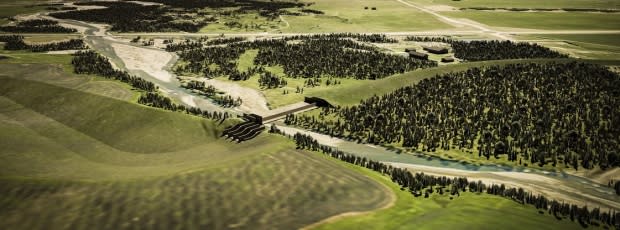Rocky View County votes unanimously to ask province to halt Springbank dam project
Rocky View County's council voted unanimously Tuesday to ask the province to stop a major flood mitigation project upstream from Calgary.
Council said it can't support the Springbank dry reservoir in its current stage and requests the project be halted so other options, like a dam at McLean Creek, can be considered.
In a report presented to the county's council, administrators said the project places impacts solely on the county and the Tsuut'ina First Nation, with no benefits for the region, other options were not given adequate study and that the Tsuut'ina were not adequately consulted.
"The fact is the report that was just made … was probably one of the most in-depth comparison reports that brought up a lot of flaws," said Reeve Greg Boehlke. "Is this the right project? I don't think so."
Tsuut'ina Chief Lee Crowchild thanked Rocky View County council and Boehlke for the decision in an emailed statement.
"The proposed Springbank dry dam is a simply massive project, with immense implications for ground water, air and the health of the river," Crowchild said.
"While flood mitigation for Calgary is absolutely necessary, there are alternatives. And those should be carefully explored before we build."
The dry dam — which could fill with up to 70.2 million cubic metres of water from a swollen Elbow River — is intended to protect Calgarians from an event like in 2013, when heavy rains and a melting snowpack sent floodwaters rushing into the city and nearby communities.
The ensuing disaster in southern Alberta killed five people, saw 70,000 flee their homes and caused billions of dollars of damage.
'Deeply offensive,' says Calgary mayor
Calgary Mayor Naheed Nenshi said he was irritated by the council's decision.
"To play political games this late, and to potentially put people's lives, and their property, and the economy of this country at risk, is beyond irresponsible," he said.
"There have been multiple scientific studies by outside experts that show that Springbank dry dam is the right choice. And the reeve says this was sprung on them, no other alternatives were looked at and there is no benefit to the county. All of those things are just not false; they're actually deeply offensive."
Calgary-Elbow MLA Greg Clark, who attended Tuesday's meeting, said Springbank is the best option to protect Calgary.
"All governments need to think about the broad public interest, not about their narrow interest," he said.
The $432-million reservoir would require about about 3,870 acres (1,566 hectares) of land.
It's faced months of delays due to landowner concerns and is currently under regulatory review by the Canadian Environmental Assessment Agency. The province said it hopes to acquire the needed space through negotiations with landowners, but if necessary will expropriate land for the project so it can be partially complete by 2021 and fully complete by the end of 2022.
The report presented to council found silt from diverted floodwater could make much of the land — some of which has been owned by the same families for generations — non-viable for agriculture, and subject to invasive weeds.
It would also impact 87 residential homeowners and a summer camp.

Lee Drewry's family has a long history on the land, going back more than a century.
"The threat of losing our land has been on us ever since 2014, when I heard on the radio the province was considering this project," he said, stating he's in favour of the McLean Creek project instead.
"We firmly believe that protecting more Albertans and harming none should be where we go on this."
Boehlke said the county wanted to officially register its opposition to the project, although he said it may not make a difference to whether or not the project is built.
The provincial government has stressed repeatedly that it is committed to getting the Springbank reservoir built, and has rejected McLean Creek as an alternative site. It's also committed $8.9 million to flood mitigation for Redwood Meadows on Tsuut'ina land.
Construction is set to break ground on the project in 2019.

